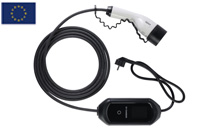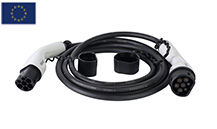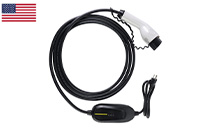CCS is a system that provides combined AC and DC charging for electric vehicles. Both AC and DC vehicle outlets can be charged through this universal interface. The combined charging system CCS complies with IEC 62196-3 and SAE J1772 standards and the system is available with IEC Type 1 (North America) and IEC Type 2 (Europe) plugs. FAFA-E is deeply involved in the electric vehicle charging field and our CCS1 and CCS2 connectors have been widely used in electric vehicles. Back in 2013 the European Commission mandated the CCS2 type charging system in accordance with IEC 62196 as a uniform charging standard throughout Europe.
Derived from the IEC 62196-2 Type 2 connector, the CCS2 connector is an enhanced version of the Type 2 AC plug with two additional power contacts, supporting both AC and DC charging up to 350KW+ DC fast charging, commonly used in countries such as Europe, Australia and India.
The locking mechanism is integrated in the CCS DC charging connector system to ensure user safety and proper EVSE operation, and this locking design is capable of carrying a high tensile force so that the EV does not disconnect from the connector while charging. In this case, the locking mechanism is monitored and its charging status is communicated to EVSE through a dedicated connection.
If the CCS2 does not receive a periodic charge level demand message from the battery management system within 100ms, the non-vehicle charging device will shut down the DC power output function to ensure the safety of the entire charging process.
The FAFA-E CCS2 connector is designed with an internal temperature sensor that protects the EVSE from damage by accurately monitoring the temperature at the power contacts, stopping or slowing down the charging process when the charging temperature is too high, and monitoring the operating temperature of the entire charging process to ensure safe charging.






 简体中文
简体中文
